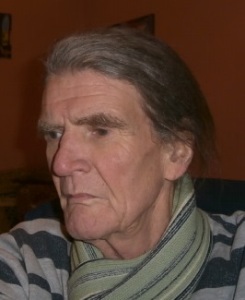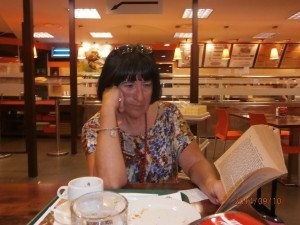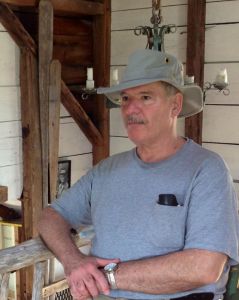This work comprises in an excerpt from the anthology on contemporary Spanish female poets entitled Las Diosas Blancas. Madrid, 1985. Copyright Ed. Ramon Buenaventura. Hiperion. This is an original and unpublished English version of the original poem written in Spanish. Translators Robin Ouzman Hislop and Amparo Arrospide would like to thank Casa del Traductor, in Tarazona and the British Literary Translation Association, East Anglia University Campus.
From this Spanish anthology –compiled by the well-known scholar and translator Mr. Ramón Buenaventura, whom we contacted earlier– a few selected authors were chosen for our joint translation work: Amalia Iglesias: Te buscare para decirte (I Will Find You To Tell You), Ana Rossetti: Triunfo de Artemis sobre Volupta (Triumph Of Artemis Over Volupta) and Isolda (Isolda) , Blanca Andreu: Para Olga (For Olga) , Isla Correyero: Los Pajaros (Small Birds), Amparo Amoros: Midas (Midas) and Criaturas del gozo (Creatures Of Joy), Rosalia Vallejo: Horno en llamarada (A Furnace In Flames) , Maria del Carmen Pallares: Sisargas (Sisargas), Margarita Arroyo: Era el mar lejos del mar ( It Was Sea Away From Sea).
We would like to thank Mr. Ramón Buenaventura and the above name poets, in advance, and let them rest assured that their work is protected by a legal Creative Commons Licence, by virtue of which the above named translators are willing to provide excerpts from their original translation work, provided that readers agree to use it under the terms of such licence. We strongly recommend reading the entire work and the poets’, who have continued evolving during these decades.
I will find you to tell you
that I am in love with life,
that I love in the agony
its lip that ignores me,
aimlessly I seek its sweet guillotine,
its blade of a thousand edges cutting my surf.
I love life
which grieves, keeps me late
in the night with bitter waking liquor
like a thread of morning fog amidst willows,
that I love its torn cyst of mandragora,
the glass lagoon which wrecks the years,
I love the uncertainty of moss and autumn,
the tenderness and sourness which flow.
In spite of this blinded fear of slopes
where I seek you
because I too evade death
and dawn.
All the fowls of the air drink glycine in your eyes,
all the fowls of the air love your body unsheltered,
all the fowls of the air inhabit your organs of alcohol without aqueducts,
all the wings burn in your combustible mind…
All the fowls of the air
leave the ruins
to search weeping that lives North of your breast,
to search the scorching fire that inhabits it,
now that they know you as a first person singular,
verb to be, time present , mode indicative.
In another violet sky, I show
that pleated girl, her bags
blue and empty.
UNTIL the sea you are the condition of the geyser
and the flaming arpeggio.
Here awaits you the subjective couch of memory which oscillates.
It now pronounces the malediction,
reconstructs that psalm
I write in beacons.
Decode the fire:
lie down on water,
whisper to the breeze your memorable eyes,
tell it that tenderness is a fleeting blow in each wave,
tell it that the undercurrent
only reaches the waistline.
why the wind remains in its penultimate looks.
WHEN this song
is no more a sign in the imagination of an ambiguous wind.
When the streets play with a seditious jungle
with you your legs in mist
in the tortured embrace of an estuary.
Or when on another day you gaze at the Mediterranean
wishing no longer to return and begin
no longer to be a wave,
nor a propitious coast,
nor a sailor’s orphanage without a dawn.
The wind, only the wind
sheltering the madness of birds,
those, others,
which die from the light beneath the willows,
those that lived because of you under a Romanesque sky,
those that pass by now
and die in the sea,
in the water fermenting an abundance of names.
When this song is only
spectre and mirage,
searched unremembered,
my heart
as a bridge between times
resting on the twilight will await you.
MY steps search lethal passports,
white lethargies for the flame which comes
and without pity burns my pupils out.
I write letters and split moons
believing in Hadrian’s serenity to await death.
I have seen how the night opens an abyss curtain
and returns me to the blows of space.
I appear at the profound birth
that intoxicates the bonfire’s sensitive latitudes
— grass playing fatuous fire
the glass lip eclipsed towards the Orient.
I have seen the tenderness inside Aries
fulfil the equinox,
border madness tracing a periphrasis, crossing the flank
when the moon lies in wait
and the north wind tames bridges’ eyes.
I have left myself, naked, to the rain
to the algid gleam of glass streets.
Through the candle you burn in the retina of the night,
in the hidden abodes
where on another day we stole with open hands.
Behind the empty volume and the vulnerable hollow
inhabited by frost trembling among nettles
another multiple bird
turns into unlikely alchemy.
SINCE never I love you and always,
from everything, perhaps, forever,
from the emphatic lightning which climbs hours’ ditch
towards the rising whip in my setting pupils,
my prompt voice, my wind:
a final vertigo —
and the most ungrateful delta to finish the journey.
Until nothingness I wait,
until remoteness of useless memory and crater without a sunset,
until doubt intoxicated by heavenly signs,
in fever and an August magnetized moon.
AUTOR:
TÍTULO: TE BUSCARÉ PARA DECIRTE
Te buscaré para decirte
que estoy enamorada de la vida,
que amo en la angustia
su labio que me ignora,
busco sin cauce su dulce guillotina,
su espada de mil filos tajando mi oleaje.
Amo la vida
que me pesa y me trasnocha,
con el licor amargo que despierta
como un hilo de bruma entre los sauces,
que amo su quiste roto de mandrágora,
la laguna de vidrio que naufraga los años,
amo la incertidumbre del musgo y del otoño,
la ternura y el ácido que fluyen.
Que amo la vida,
a pesar de ese miedo cegado de vertientes
donde te busco,
porque aún esquivo la muerte
y amanece.
TODAS las aves beben glicinas en tus ojos,
todas las aves aman tu cuerpo a la intemperie,
todas las aves habitan tus órganos de alcohol sin acueducto,
todas las alas incendian tu mente combustible.
Todas las aves
salen de las ruinas
para buscar el llanto al norte de tu pecho,
para buscar el fuego caliente que lo habita,
ahora que te saben primera persona singular,
verbo ser y presente indicativo.
Aquella niña plegada a otro cielo violeta
me enseña sus bolsillos
azules y vacíos.
HASTA el mar tu condición de géyser
y de arpegio incendiado.
Aquí te espera el lecho subjetivo de memoria que oscila.
Pronuncia ahora la maldición,
reconstruye el salmo aquel
escrito en las antorchas.
Descodifica el fuego:
acuéstate en el agua,
susúrrale a la brisa sus ojos memorables,
dile que la ternura es un golpe fugaz en cada ola,
dile por qué la marejada
sólo sabe trepar a su cintura,
por qué se queda el viento en sus penúltimas miradas.
CUANDO esta canción
ya no sea un signo en la imaginación ambigua del viento.
Cuando las calles jueguen a selvas sediciosas
y tú te pierdas en la niebla,
en los tortuosos brazos de la ría.
O cuando otro día mires el Mediterráneo
y ya no quieras volver a empezar
y ya no quieras ser ola
ni costa propicia
ni asilo marítimo de niños sin aurora.
El viento, sólo el viento
acogiendo la locura de los pájaros,
aquellos, otros,
que morían por la luz bajo los sauces
aquellos que vivían por ti en la frente románica del cielo,
los que ahora pasan
y mueren en el mar,
en el agua donde fermenta la espesura de los nombres.
Cuando esta canción ya sólo sea
espectro y espejismo,
buscado desrecuerdo,
mi corazón,
como un puente entre los tiempos,
te esperará sentado en el crepúsculo.
MIS pasos buscan pasaportes letales,
letargos blancos para la llama que viene
y sin piedad me abrasa las pupilas.
Escribo cartas y lunas demediadas
mientras creo en la serenidad de Adriano para esperar a la muerte.
He visto cómo la noche abre una cortina de abismo
y me regresa de golpe a los espacios.
Me he asomado a la eclosión profunda
que embriaga las latitudes sensibles de la hoguera
y al pairo el césped jugando a fuego fatuo,
el labio de vidrio eclipsado hacia Oriente.
He visto entrar la ternura en Aries,
cumplirse el equinoccio,
bordear la locura trazando una perífrasis, cruzando de costado
cuando la luna acecha
y la tramontana domestica los ojos de los puentes.
Me he dejado a la lluvia desnuda y permeable,
al álgido destello de las calles en vidrio.
A través de la vela que tú enciendes en la retina de la noche,
en los ocultos ámbitos
en que otro día robamos con las manos abiertas.
Detrás del volumen vacío y el hueco vulnerable
donde habita la escarcha tiritando entre ortigas
y otro pájaro múltiple
se hace alquimia improbable.
DESDE nunca te quiero y para siempre,
desde todo y quizá y para siempre,
desde el rotundo rayo que sube por la acequia de las horas
al látigo crecido en mis pupilas ponientes
veloz mi voz, mi viento:
vértigo de desembocadura –
y el más ingrato delta para acabar el viaje.
Hasta la nada espero,
hasta lo lejos de la memoria inútil y el cráter sin crepúsculo,
hasta la duda embriagada de rótulos celestes,
en la fiebre y la luna imantada de agosto.

Amalia Iglesias was born in Menaza, in the province of Palencia, in 1962. She won the prestigious Adonais prize in 1985 for Un lugar para el fuego and has published several other books of poetry. She lives in Madrid, where she edits Revista de Libros and La Alegría de los Naufragios. Her work has been widely anthologized amediavoz.com/iglesias.htm
Poeta española nacida en Menaza, Palencia, en 1962.Desde 1970 se trasladó con su familia a Bilbao donde se licenció en Filología Hispánica por la Universidad de Deusto.Actualmente vive en Madrid donde ha sido coordinadora del suplemento Culturas de «Diario 16». Dirige desde su creación,en 1996, de Revista de Libros, de la Fundación «Caja Madrid» y además colabora en la revista de poesía La alegría de los naufragios y en la sección Contemporáneos del suplemento cultural del periódico «ABC». Su obra poética está compuesta por «Un lugar para el fuego» 1984, «Memorial de Amauta» 1988, «Mar en sombra» 1989,«Dados y dudas» 1996, «Tótem espantapájaros», «La sed del río» y «Lázaro se sacude las ortigas» 2006. Ha sido galardonada con los premios de poesía Adonáis en 1984, Alonso de Ercilla del gobierno Vasco 1995, con el accésit del Jaime Gil de Biedma en 1996 y el Premio Francisco Quevedo de poesía 2006.

Robin Ouzman Hislop Editor of the 12 year running on line monthly poetry journal Poetry Life and Times. (See its Wikipedia entry at Poetry Life and Times). He has made many appearances over the last years in the quarterly journals Canadian Zen Haiku, including In the Spotlight Winter 2010 & Sonnetto Poesia. Previously published in international magazines, his recent publications include Voices without Borders Volume 1 (USA), Cold Mountain Review, Appalachian University N Carolina, Post Hoc installed at Bank Street Arts Centre, Sheffield (UK), Uroborus Journal, 2011-2012 (Sheffield, UK), The Poetic Bond II & 111, available at The Poetic Bond and Phoenix Rising from the Ashes a recently published Anthology of Sonnets: Phoenix Rising from the Ashes. He has recently completed a volume of poetry, The World at Large, for future publication. He is currently resident in Spain engaged in poetry translation projects.

Amparo Arrospide (Argentina) is a Spanish poet and translator. She has published four poetry collections, Mosaicos bajo la hiedra, Alucinación en dos actos y algunos poemas, Pañuelos de usar y tirar and Presencia en el Misterio as well as poems, short stories and articles on literary and film criticism in anthologies and both national and foreign magazines. She has received numerous awards. Together with Robin Ouzman Hislop, she worked as co-editor of Poetry Life and Times, an E-zine from 2008-2012
robin@artvilla.com
PoetryLifeTimes
Poetry Life & Times
editor@artvilla.com







